A Brief Colonial History Of Ceylon(SriLanka)
Sri Lanka: One Island Two Nations
A Brief Colonial History Of Ceylon(SriLanka)
Sri Lanka: One Island Two Nations
(Full Story)
Search This Blog
Back to 500BC.
==========================
Thiranjala Weerasinghe sj.- One Island Two Nations
?????????????????????????????????????????????????Sunday, December 27, 2020
The Nation-State Law had its day in court, as did the farce of Israeli democracy
During the hearing, the High Court justices saw no problem with demoting the status of Arabic and claimed that 'equality' is something best left for the future.
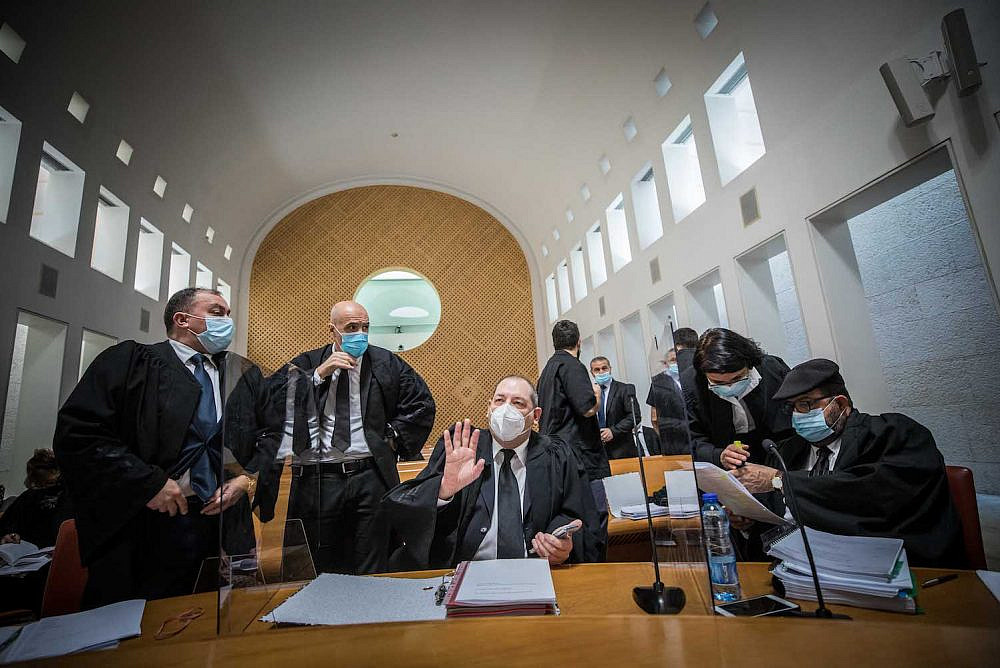 |
Attorneys arrive to the Supreme Court for a hearing on petitions put forth against the Jewish Nation-State Law, Jerusalem, December 22, 2020. (Yonatan Sindel/Flash90)
Two-and-a-half years after the Knesset passed the Jewish Nation-State Law, which constitutionally enshrined second-class status for Israel’s Palestinian citizens, the High Court of Justice held its first hearing on the law on Tuesday.
As has become customary in hearings in which the farce of Israeli “democracy” is at stake, the setting was perfect: on the bench sat an expanded panel of 11 justices headed by Supreme Court President Esther Hayut, while the hearing was broadcasted live on the internet. Because the law was petitioned by 15 different groups and individuals, and due to COVID-19 restrictions, it took over an hour for people to assemble in the hall.
The range of petitioners was varied: along with the petitions of the Arab public leadership, the Association for Civil Rights in Israel (ACRI), and Meretz, petitions were filed on behalf of individuals and groups, Arabs and Jews — including one religious Zionist family and a “Jewish” petition against the law, which argued that the it contradicts basic Jewish values. Some petitioners sought to “amend” certain clauses in the law, others wanted to add to it a clear commitment to civic equality, with others hoped to abolish it altogether.
There was also the Mizrahi petition, which I had the privilege of being among its initiators and signatories, and which argues that the law erases Mizrahi cultural legacy while perpetuating injustices against Jews who hail from Arab countries as well as Palestinian citizens of Israel.
As expected, the two sections of the law that drew the most fire were Section 4, which concerns the official demoting of the status of the Arabic language, and Section 7, concerning the “encouragement of Jewish settlement” as a value that the state is obligated to promote.
Already at the opening of the hearing, Hayut clarified that the High Court is concerned with whether or not it even has the authority to repeal a Basic Law [the equivalent of a constitutional amendment] and — assuming there is a reason to do so — whether the law itself can be interpreted in a way that is consistent with the values of democracy.
Israel does not have a constitution, but rather a set of basic laws that function as a kind of bill of rights. For years, various Israeli politicians have championed the creation of a formal constitution, although this has never gained enough political traction to become reality.
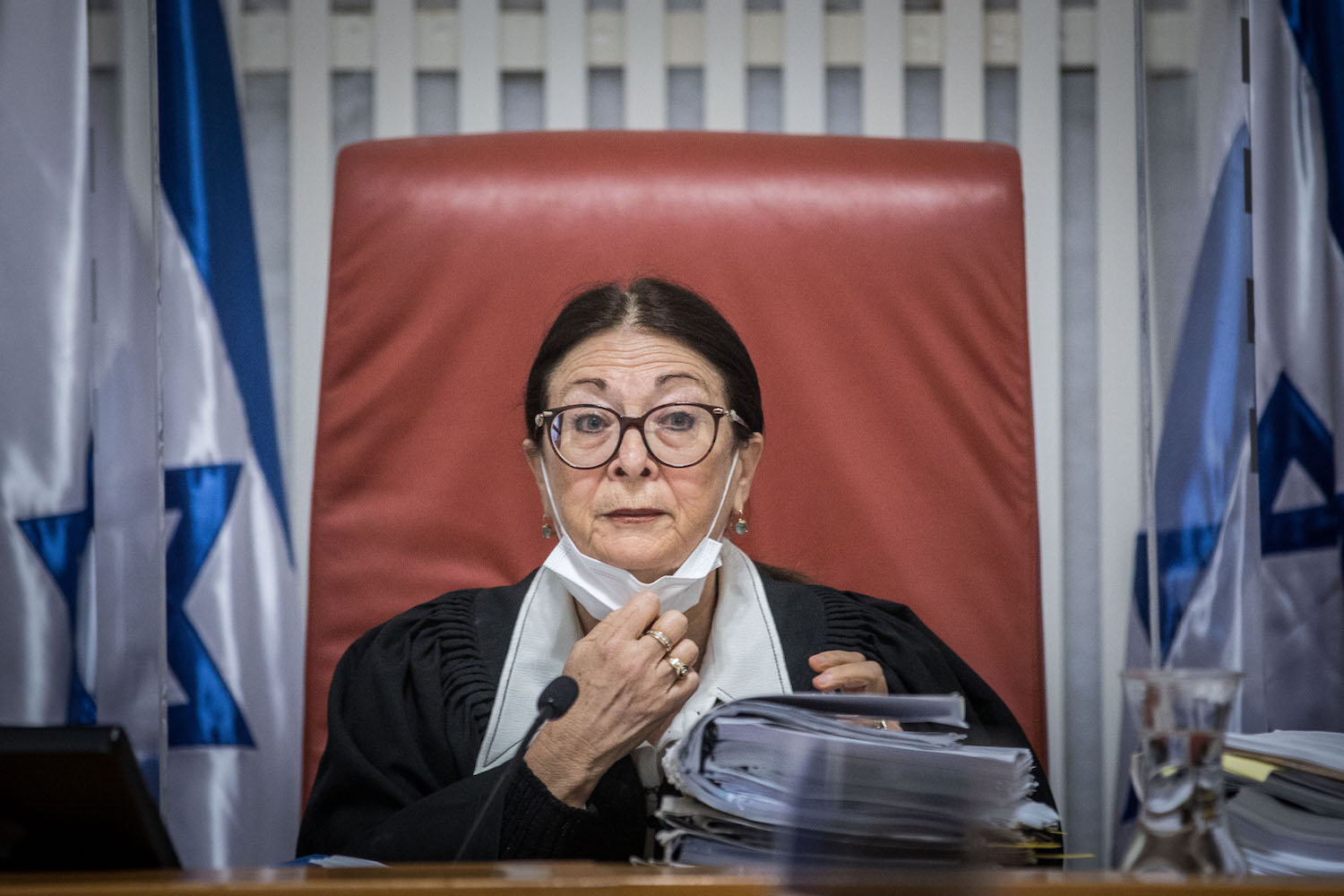 |
President of the Israeli Supreme Court Esther Hayut seen during a hearing on petitions against the Jewish Nation-State Law, Jerusalem, December 22, 2020. (Yonatan Sindel/Flash90)
The first to speak was Atty. Samer Ali, who represented the Druze community’s petition against the law. While the Druze have been a minority group that has never questioned the Jewish-Zionist identity of the state and fully cooperated with it from its earliest days, the Jewish Nation-State Law was a breaking point for many in the community.
Ali repeatedly spoke about the “blood oath” between the Druze public and the state, and the price Druze citizens pay for that oath. “There is no legislator that can contradict this blood oath for 70 years by categorizing the Druze today as citizens with no identity and no self-representation,” Ali said. “We identify with the symbols of the state, with the flag, we have never had a separatist claim, we have never questioned the Jewish identity of the state. The members of the community have played an integral part in building the resilience of the State of Israel from its first years.”
Ali ended on a more personal anecdote: “This morning, my son, a soldier, drove with me. When he stepped out of the car, he asked me, ‘Dad, is there a chance I’ll go back to being a first-class citizen again today?'”
After two more petitioners came the turn of Atty. Hassan Jabareen, the director of Adalah — The Legal Center for Arab Minority Rights, who petitioned the court on behalf of the Arab Higher Monitoring Committee, an extra-parliamentary body that represents Arab citizens of Israel and coordinates activities among various Palestinian groups in Israel, as well as the heads of the Arab local authorities and the Joint List. In effect, this was the lead petition.
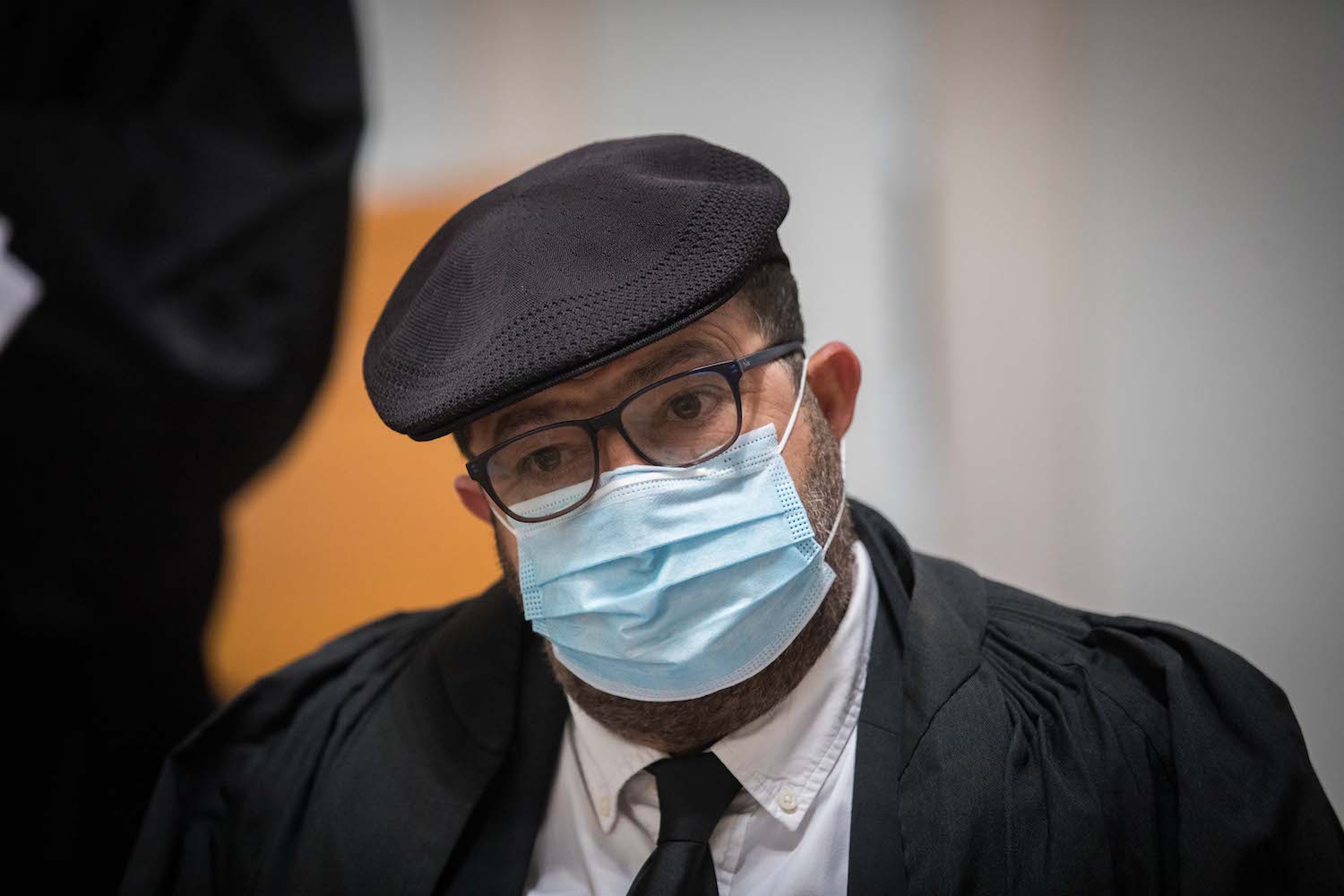 |
Adalah General Director Hassan Jabareen arrives for a court hearing on the Jewish Nation-State Law at the Supreme Court, Jerusalem, December 22, 2020. (Yonatan Sindel/Flash90)
“For the first time since 1948, the court is tasked with the question of the status of the Arab minority in Israel,” Jabareen said. “We are not asking the court to determine the scope of our rights, but to answer one question and one question only: what does the exclusion of the Arab minority in the Basic Law mean?”
Jabareen combined legal arguments with normative and ethical ones. Among other things, he mentioned that all Basic Laws that have been passed so far have received support from across the political spectrum. The Jewish Nation-State Law is the first that has opponents among the coalition — that is, by Arab members of Knesset.
Throughout his remarks, Jabareen was repeatedly interrupted by the justices. When he argued that the clause encouraging Jewish settlement violated the principle of “separate but equal,” Hayut responded: “The fact that Jewish settlement is perceived as a national value does not mean that there should be no equal allocation and legitimate civil rights for others.” Justice Menachem Mazuz followed: “The value of settlement already appears in the Declaration of Independence; it must not harm the value of equality.”
As if Israel does not have a history of over 70 years of discrimination, in which hundreds of towns, cities, and villages were established for Jews while not a single new locale was built for Palestinian citizens. As if Palestinian land was not expropriated for constructing Jewish communities. As if Umm al-Hiran had never been demolished to build the Jewish settlement of Hiran on its ruins.
“The value of settlement is a Zionist value, one of the values on which the Zionist state was founded. It also has status,” Hayut said. Mazuz offered his own rejoinder: “You assume a conflict between two values. I do not see a conflict: the fact that the state will encourage Jewish settlement does not conflict with the right of every citizen to live wherever he wants, receive allocations, etc.”
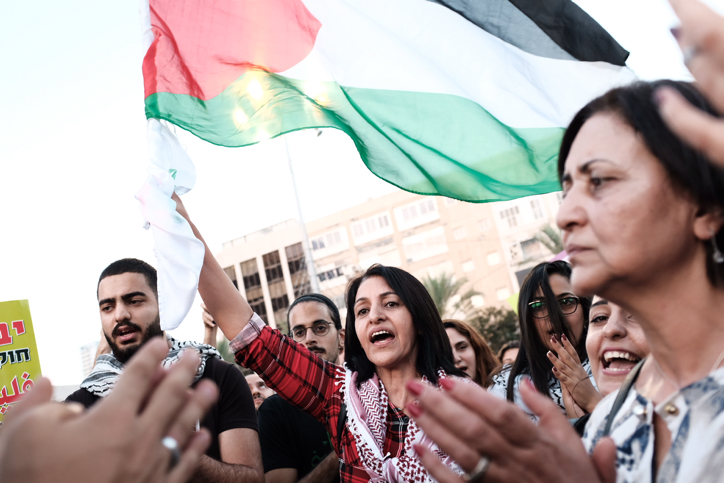 |
Palestinian citizens of Israel and Jewish supporters protest against the Jewish Nation-State Law in Rabin Square, Tel Aviv, August 11, 2018. (Tomer Neuberg/Flash90)
When Jabareen mentioned that the city of Nazareth Illit was built on land belonging to Arab citizens, Hayut tried to reassure him: based on this law, she says, it is impossible to expropriate land from Arabs.
The same feigned innocence was demonstrated by the court when it came to arguments regarding the violation of the status of the Arabic language. “The law takes the existing situation and says that what was [in the past] will remain,” Justice Yitzhak Amit said. “[The lawmakers] wanted to say a trivial thing: that Hebrew is the dominant state language, and because of the lack of clarity around Arabic, they said [it has] ‘special status’. What’s the difference? Why is it so painful that it is special and unofficial?”
To this Jabareen replied: “Because there is a violation of convention here. The rules of the game have changed. My language, at least formally, has maintained its status from the time of the Ottomans until the 20th Knesset. Language was the only collective right [afforded to] the indigenous minority in its homeland.”
“To violate this status constitutionally is not a change? The Arab is an Arab because of his language!” Jabareen continued. “That is what unites the Christian, Muslim and Druze Arabs. So the fact that there are 61 MKs [in favor of the law] means it can be harmed? And only Jews! Jews are imposing a new constitutional identity on Arabs — isn’t that a problem? That’s where the discussion ends? Because 61 Jewish MKs made a decision?”
‘We have been betrayed by the state’
One of the main arguments put forth against the Jewish Nation-State Law is the absence of the word “equality.” To this, Justice Hanan Melcer responded with the following creative answer: “Every Basic Law is a chapter in a future constitution. [The Jewish Nation-State Law] is a chapter and Basic Law: Human Dignity and Liberty is a chapter. If necessary, clarifications will be made about equality. This needs to be seen as part of a whole. Perhaps in a future constitution there will be a chapter about the protection of minorities.”
Atty. Eitay Mack, who represented the petition against the law in the name of Jewish values, responded to Melcer: “So freeze these parts [of the law] until the next chapters are legislated.”
Atty. Ali Shakib, another Druze petitioner, also referred to Melcer’s comment: “We have been talking about a constitution that will be established in the future for the last 70 years, we do not know when that will happen. The Jewish Nation-State Law is a foundational law in which the value of equality must be anchored.”
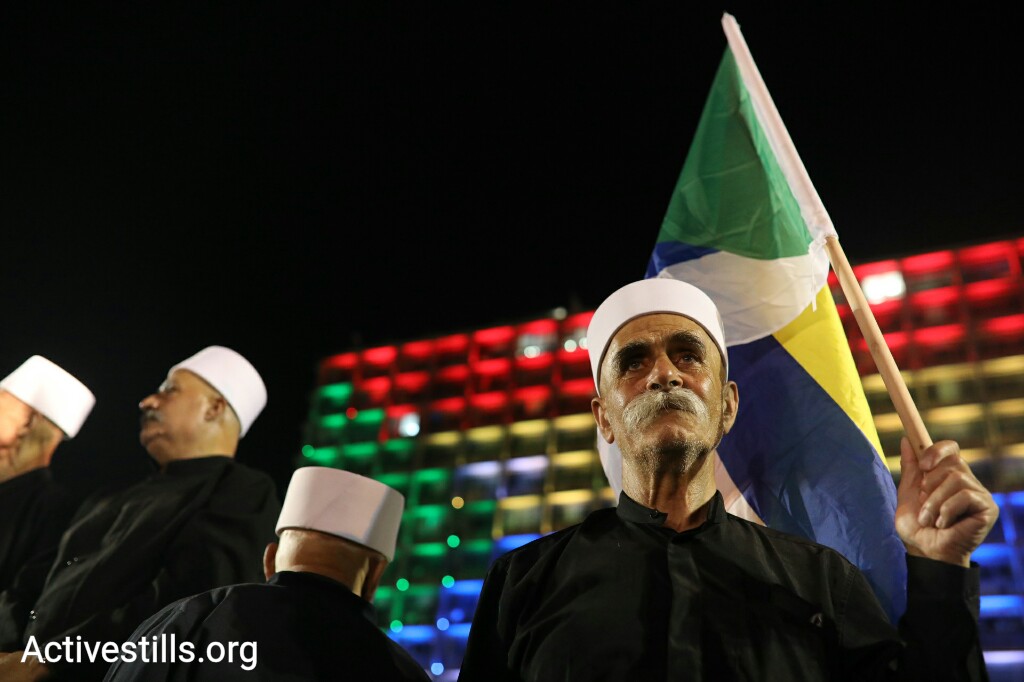 |
Tens of thousands of protesters joined the Druze community in rejecting the Jewish Nation-State Law at Rabin Square in Tel Aviv on August 5, 2018. (Oren Ziv/Activestills.org)
“Jewish students who are educated on this law that has already entered the [schoolbooks] are going to be raised on [the idea of] a Jewish state alone,” Shakib continued. “There is not a word on minority rights; it is a badge of shame for the State of Israel. This law cannot be saved by interpretation, it will not benefit the Jewish public consciousness. It is doubtful whether Jewish students who are educated on this law will be willing to accept Arab citizens at all in the future.”
“This will be the first law in the constitution of the state of the Jewish people,” he added. “It is precisely the Jewish people, with their history, that must ensure the opening of its constitution [by enshrining] minority rights. As a Druze I say: we have been betrayed by the state, but I do not think the state should legislate for the Druze. Every form of sectorial legislation is unacceptable.”
Mizrahi solidarity
When it was the turn of Atty. Neta Amar Schiff, who represented the Mizrahi petition against the Jewish Nation-State Law, the justices lost whatever remnants of tolerance they had shown thus far, repeatedly and rudely interrupting her. “Of all the petitions, this is the most incomprehensible,” said Amit.” One struggles to see how this law is discriminatory against Jews.”
And really, how does a Mizrahi explain to the court that she both benefits and is a victim of the state’s racial hierarchy? After all, in Israel the victims must always be Jews, and this law puts Mizrahim on the “right” side of the victimhood equation. So by what right can we claim to face injustice?
“Our petition emphasizes the Archimedean point, which establishes our right to examine the law from our point of view,” Amar-Schiff explained. “Language is a cultural stamp. It creates reality through the speech act. Language creates consciousness. It is not an independent entity; its existence depends on its speakers.”
“The Jewish Nation-State Law is intended to make present the rights of one group at the expense of another group, based on language,” Amar-Schiff went on. “The Arabic language cannot be separated from its speakers, including my Arabic-speaking grandmother. Arabic is an integral part of Judaism, it is my language as person who is of this place. Arabic is part of the Jewish identity of the descendants of Islamic countries. It is different from any other language because there was a special active effort to erase it among Mizrahim. It is the language of this place, the Mizrahim came from one Arab region to another, it is not an immigrant language.”
“The damage is already here,” she concluded. “Every entrenchment of the existing situation is an entrenchment of the damage, another hammer in the head of all those Jews who want to erase the shame, connect to the region, to the Arab citizens — and cannot. Shame and humiliation accompany the Arabic language.”
Mazuz responded: “You are piggybacking. What could you do yesterday that you won’t be able to do tomorrow [as a result of this law]? How does this harm a Jew whose grandparents were born in an Arab country? How is demoting [the status of Arabic] relevant to the cultural lives of those with origins in Arab countries and who want to maintain their Arabic language and culture?”
The fact that this remark came from Mazuz, who was born in Tunisia, was particularly jarring. That he does not understand the connection between the suppression of the Arabic language and Arab identity and the historical oppression of the Mizrahim in Israel perfectly encapsulates the tragedy of Mizrahim in Israel.
Before the court adjourned for lunch, the Knesset’s legal representative presented her response to the petitioners’ allegations. Her starting point was simple: the High Court cannot intervene in basic laws at all.
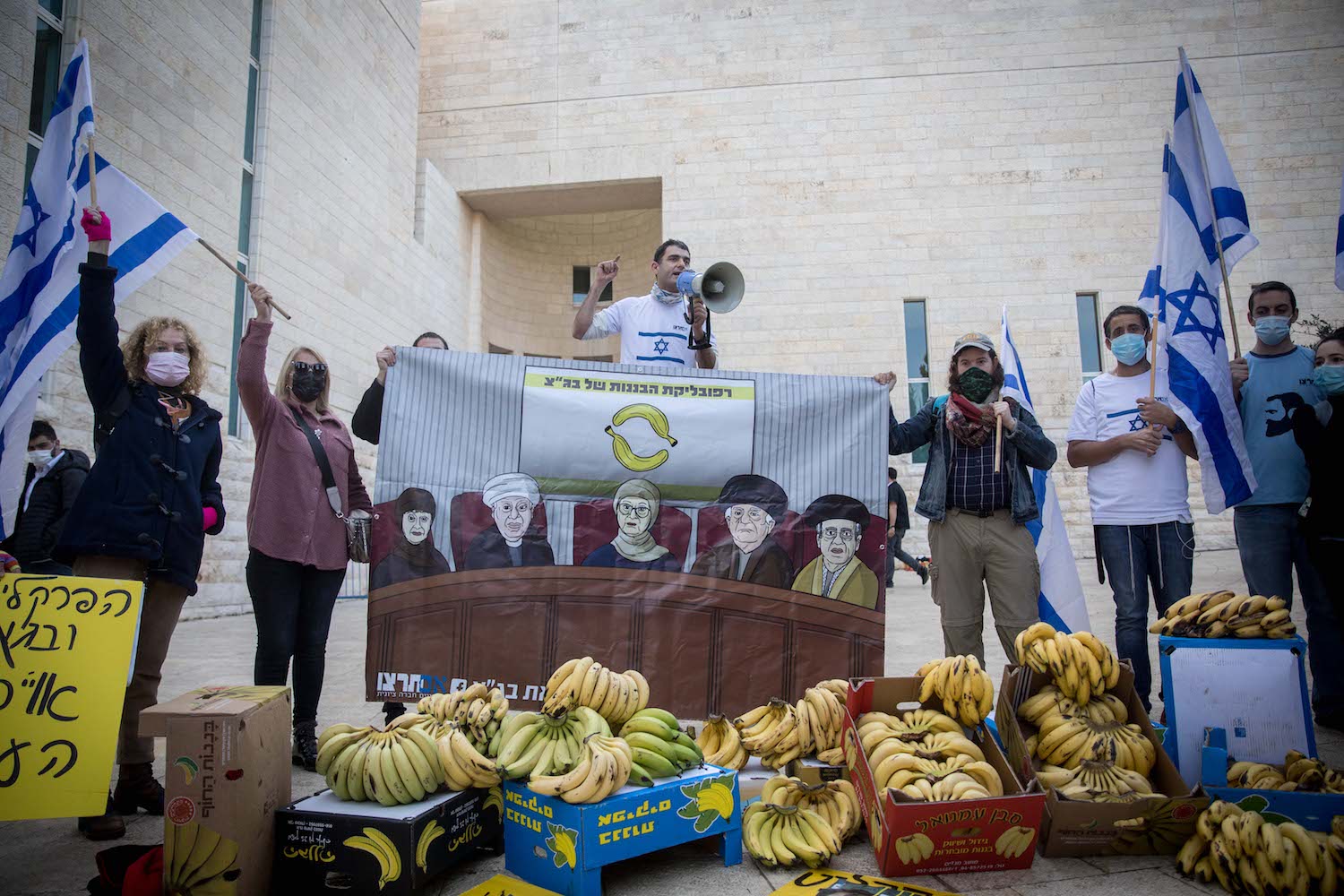 |
Members of the far-right ‘Im Tirzu’ movement protest protest outside the Supreme Court in Jerusalem during a hearing on the Jewish Nation-State Law. The activists decried the court as an Islamic “banana republic,” December 22, 2020. (Yonatan Sindel/Flash90)
This led to an entire discussion around the question of the “extreme cases” that justify judicial intervention. In the past, the justices have repeatedly used the example of the denial women’s suffrage, as if there aren’t currently members who try to deny the right of Palestinian citizens to vote.
Justice Melcer reminded the Knesset’s legal representative that according to the Declaration of Independence, the state will strive to develop the country for the benefit of all its inhabitants, and that Section 7 deviates from this principle. To that she responded laconically: “Some members of Knesset expressed concern that the value of settlement as a national one would be perceived as illegitimate. If there is no dispute that the value of settlement is a national one, what is the problem with anchoring it in the law?”
The highlight of the Knesset representative’s rhetorical stunts came in response to the demotion of Arabic. “The law establishes a special status for Arabic! In a basic law that deals with the national Jewish identity of the state, the Arab minority has been granted a special status for its language! It is actually an upgrade, not a demotion!” she argued passionately.
After six hours of cynical, frustrating, and largely predictable discussion, I left the High Court of Justice. On the floor in the courtyard I found the remains of a demonstration by far-right activists belonging to the Im Tirzu movement, which had taken place there earlier. One of the signs read: “The Supreme Court is the enemy of the people.” The irony was almost too much to bear.

